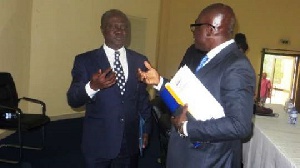 The biennial report examines the progress, prospects, and challenges of social development in Ghana
The biennial report examines the progress, prospects, and challenges of social development in Ghana
The Institute of Statistical, Social and Economic Research (ISSER), University of Ghana, has launched its 2016 edition of the Ghana Social Development Outlook (GSDO) report.
The biennial report examines the progress, prospects, and challenges of social development in Ghana and offers policy prescriptions across various social sectors.
Since 2012 the Social Division of the ISSER, has produced the GSDO as a flagship evidence-based research and analysis document.
The third edition in the series (GSDO 2016) has thematic areas such as health, education, employment, housing, governance, water and sanitation, energy and environment.
The report indicates that in 2014/2015 68 per cent of Basic Education Certificate Examination (BECE) candidates transitioned from junior high school into senior high school; implying the 32 per cent of them truncated their education at the JHS level and were thrown prematurely into the job market.
On the health sector, it said maternal mortality declined from 503 in 2005 to 144 in 2014; of which the National Health Insurance Scheme (NHIS) might have played a major role.
On sanitation the report said about 32 per cent of rural household in Ghana do not have toilet facilities, while the corresponding figure for rural savannah was about 72 per cent.
Professor George Gyan-Baffour, the Minister of Planning, who formally launched the report on Wednesday in Accra, said the report would go a long way to make his work easier as the chairman of the inter-ministerial committee on SDGs.
He said: “We will work closely with you on the data to report on the implementation of the SDGs. We will also work closely with you in monitoring the implementation of the government’s coordinated programme for economic and social development of this country, which runs from 2017 to 2024.
“And also with the Medium Term Development Policy Framework 2018 to 2021, which feeds into the national budget.”
Professor Gyan-Baffour lauded ISSER for the report adding that government was committed to implement its recommendations for the benefit of citizenry.
Prof Felix Ankomah Asante, the Director, ISSER, said the GSDO 2016 comes at a time that the Millennium Development Goals (MDGs) had ended and we now have the Sustainable Development Goals (SDGs).
He said a number of chapters of the report were devoted to discuss the legacy of the MDGs on various dimensions of social development policy and practice in Ghana and looks ahead to what the SDGs might mean for the country.
On data quality issues, which were carried in the report, Prof Asante said: “This is an area, which has been neglected. As a country, we are not investing in data collection and neither are we making sure that data collected is of good quality”.
“We can achieve our development goal if we have good data to monitor the progress we are making. For us to be able to monitor the SDGs, we need good data,” he added.
He cited that the use of data to make a case for or against a policy was the mandatory towing issue; declaring that “because of poor data, the reason for which we should have such a system could not be articulated”.
Dr Nana Akua Anyidoho, Senior Research Fellow/Coordinator, GSDO 2016, said Ghanaians were very passionate about education; stating that “as we believe, it is the only way which will help us have a better life”.
She said tertiary education has been partially neglected when it comes to policy making, she suggested that more attention should be paid to quality education by assessing learning outcomes.